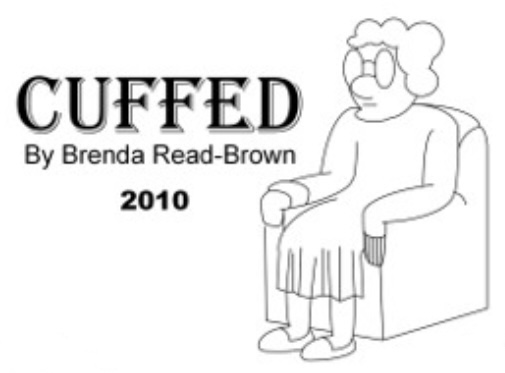
A One Act Play by Brenda Read-Brown about communication.
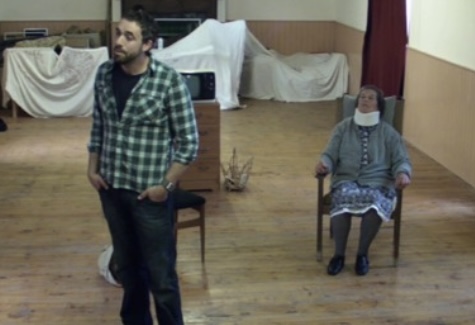
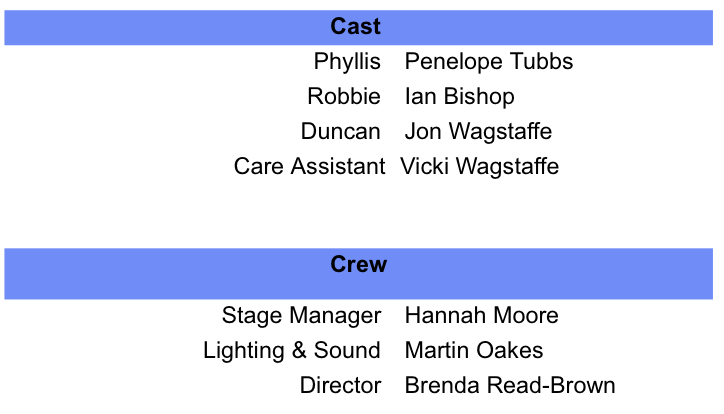
The play was performed at the GDA One Act Play Festival at the Kings Theatre, Gloucester on Thursday 5 June 2010. It won:
Best in Festival
Best in Gloucestershire
Best Original Play
Best actress (Penny Tubbs)
The GDA play writing competition
The Geoffrey Whitworth Trophy: the All England Theatre Festival UK play writing competition.
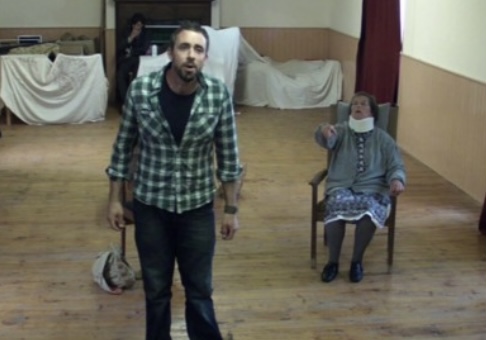
Cuffed went through to the quarter finals of the All England Theatre Festival, held in Marlborough on 17th April.
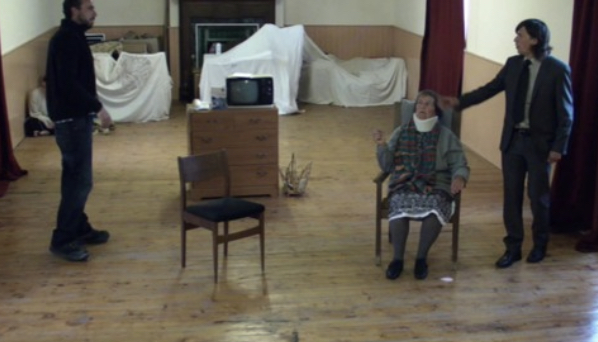
When Robbie, a contract electrician, mistakenly enters the room of a resident in a care home, he doesn’t know what he’s letting himself in for. Somehow he develops a relationship with Phyllis, a stroke victim who can hardly speak and who has very limited movement. She teaches him to look at things properly, and helps him in his attempts to come to terms with the death of his wife; he gives her the incentive to struggle to speak again. Not everyone sees their friendship for what it is, though, and when Phyllis’ grandson Duncan appears, Robbie is banned from visiting Phyllis again. But perhaps it doesn’t end there…
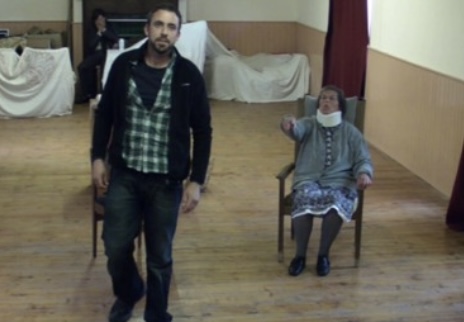
GLOUCESTER ONE-ACT FESTIVAL 2010 FULL ADJUDICATION:
Adjudicated by Mike Kaiser of GODA
THE PLAY
This original play, directed by the author, has a very interesting proposition about communication as the young workman and the old lady suffering from a stroke do manage to find a way to understand each other. The apparently easy task of the actress who only has to learn one sound –‘Errr’ – in fact becomes very subtle and demanding as their ability to communicate increases.
It is partly to do with the willingness, patience and sympathy of the workman. Partly it is about the lack of individual attention given by either the nursing home or relatives. When the grandson rudely interrupts the progress, Phyllis (or Hope) is going to be left stranded again.
On reading the script, before seeing the production, my concern was that this final development might come across as too harsh, too hostile so the challenge is to make it believable. Another challenge is that as well as being capable of extremely limited sounds, Phyllis is static so all the variation has to come from Robbie.
PRESENTATION
The set was fairly minimal with a couple of chairs as the main focal point and a chest of drawers with a TV on at the rear. What there was did suggest the institutional nature of a small room.
Costume was fine with the workman Robbie having just enough to show that he was a tradesman working with his hands. There were some swift changes of tops between scenes to show that this was another day. When Duncan the grandson finally appeared, there was a difference shown in his city clothes that reflected not only occupation but perhaps also a class divide. The care assistant was authentic looking too and none of these points was pushed to an extreme.
The lighting was simple and bright with no special effects. The opening music of Glenn Miller – ‘Moonlight Serenade’ I think – was well chosen to be evocative of a world that Phyllis would remember but which is now quite a long way into the past.
PRODUCTION
We had a brisk start. He is almost gone when he realises his mistake and the play could have been over at that point! The slightest gesture by her holds him and leads him in to try and communicate. The growth of the signals system is intriguing and soon drew the audience in. It was fascinating that even at this basic level, the conversation could still have rise and fall. Once we had understood ‘Yes’ and ‘No’ the more circular motion was more demanding. It was as if we were learning with him.
The handling of the conversation was very natural from Robbie. His acting was convincing not only in his dealings with her but in the reaction to the whole situation; several times he showed a nervous awareness of the fact that he shouldn’t be there and might even be breaking the law. He had a lovely natural sense of humour and brought out every possibility of this in the script. The giving of the name Phyllis was only one example.
Phyllis herself went through an amazing range of emotions including quite a wicked sense of humour of her own. The strength of her mind, her intensity, was first seen at the end of the first scene when she had to convey her desperation that this might be a one-off accident and that he would not return. The fact being demonstrated was that words are only one way to communicate and if we are prepared to focus, meaning will emerge.
The first blackout for a swift change of tops was not quite swift enough so cover it with music and then you can take your time a little. You can even bring up a dim spot on her almost at once while it is playing and that will serve the purpose of showing her trapped and lonely in her room. When Robbie returned, the exchange about her left-handedness was really well timed as eventually the penny dropped with him.
A deeper level was reached during the raindrops conversation because now he is becoming her medium to the outside world. Something as simple and natural as rain is what she misses. He is now talking about not facts or news but feelings and emotions. It forces him to think about things more deeply and examine his own feelings. The use of an imaginary window out front had him facing us and a powerful stage picture of her emotions passing over her face behind him which he does not see but we do. It was a clever piece of staging. Similarly, her acting as he muses on the effect of sunlight on dust particles was beautifully done.
The next really big step was in his revelations about the loss of his wife to cancer, again delivered almost to himself out front. Maybe this was too much like the previous scene and a grouping that should be saved for one scene only. Perhaps he could be seated for this one, looking across her and still pretty much in his own thoughts. Whatever you decide, having built up quite a strength of feeling in this passage, Robbie might be better to come out of it more slowly as the audience digests what we have learnt.
The arrival of Duncan was immediately sharp and unpleasant. Some of his remarks seem overplayed, mostly on the lines that if people can’t speak then they can’t hear, think or have feelings either. The gist of it was – there’s no use talking to you, you’re a vegetable. Even the detail of bringing a card a day late was weakened by being pushed too far. Why would he leave it where she cannot get to it and why would he not open it for her? He doesn’t have to be a black-hearted villain from a melodrama to make the point that he doesn’t find time to visit very regularly.
The face to face confrontation though worked well with the two men. They generated some tension and the fact that Robbie had no power at all to insist on anything added to his frustrations. The passing of the piece of paper was clear but the likelihood of it being of any use was clearly remote. It was a strong scene in that the onlookers in the audience know where the truth lies but are powerless to act. As throughout the play, the acting in of Phyllis behind all this was moving and spoke volumes except that Duncan was not aware of it.
After Robbie has left, Duncan is again given some very harsh lines which push him back to the stereotype of when he first came in.
ACTING
Robbie (Ian Bishop)
This was a thoroughly convincing performance with a fine reading of the character and how it should be delivered – the voice, accent and manner of delivery were all just touched in at the right level. He was the basically decent but ordinary workman and yet he was capable of expressing feelings too.
It was a reminder of the fact that in hospitals and nursing homes often the people who do the most in communicating with patients and cheering them up are not the consultants and trained professionals but the porters and orderlies. In effect, this was a thirty minute monologue but the words were beautifully controlled and the communication with Phyllis was varied and fascinating.
It was made to look easy and natural which of course is the knack of skilled acting. Well done and you thoroughly deserved your award.
Phyllis/ Hope (Penelope Tubbs)
This was a terrific and consistent performance. Her head was back and her body and left arm were still and yet she communicated so much through single hand gestures and a most expressive face. There was a whole range of emotions. She was particularly good at the curt, snappy reactions that older people with health problems sometimes have, simply because they do not have access to the full range of more subtle gestures and speech.
She still managed to convey a rather wicked spirit and a sense of humour. In fact, that is one of the things that Robbie and her liked about each other. Very well done too.
Duncan (Jon Wagstaffe)
He came in sharply with his unpleasant attitudes and remarks as if she is deaf or stupid. It is not a role to endear the actor to the audience but it certainly made his character clear from the first moment. He showed a determination in his body language in standing in front of Robbie and laying down the law.
Care Assistant (Vicki Wagstaffe)
This was an excellent cameo with all the emphasis on the facial expressions and body language too. As she moved about the rooms dealing with the balloons, the absolute lack of care showed in her face and mannerisms, chewing gum and not bothering to enlighten even a minute or two of Phyllis’ day with chat.
CONCLUSION
All the original plays during the week were interesting and the dilemma raised here is not uncommon. Let’s play Devil’s Advocate. What would you think if a much younger man formed a friendship with a frail, elderly relative of yours?
We are allowed to see this unusual friendship from the inside as it develops and it did so in a subtle and delightful way. The acting was of a high order especially from Robbie who was extremely natural. However, Phyllis’ skill should not be underestimated either and it was astonishing how much detail she was able to convey. The rehearsal period must have been exhausting and the intensity of performance quite draining.
The final scene was short, sharp and brutal – possibly too much so. Maybe the piece could be revised after seeing how it comes across in performance. That is the advantage of putting it before an audience and having the author within your company.
Many thanks for an absorbing and enjoyable evening.
